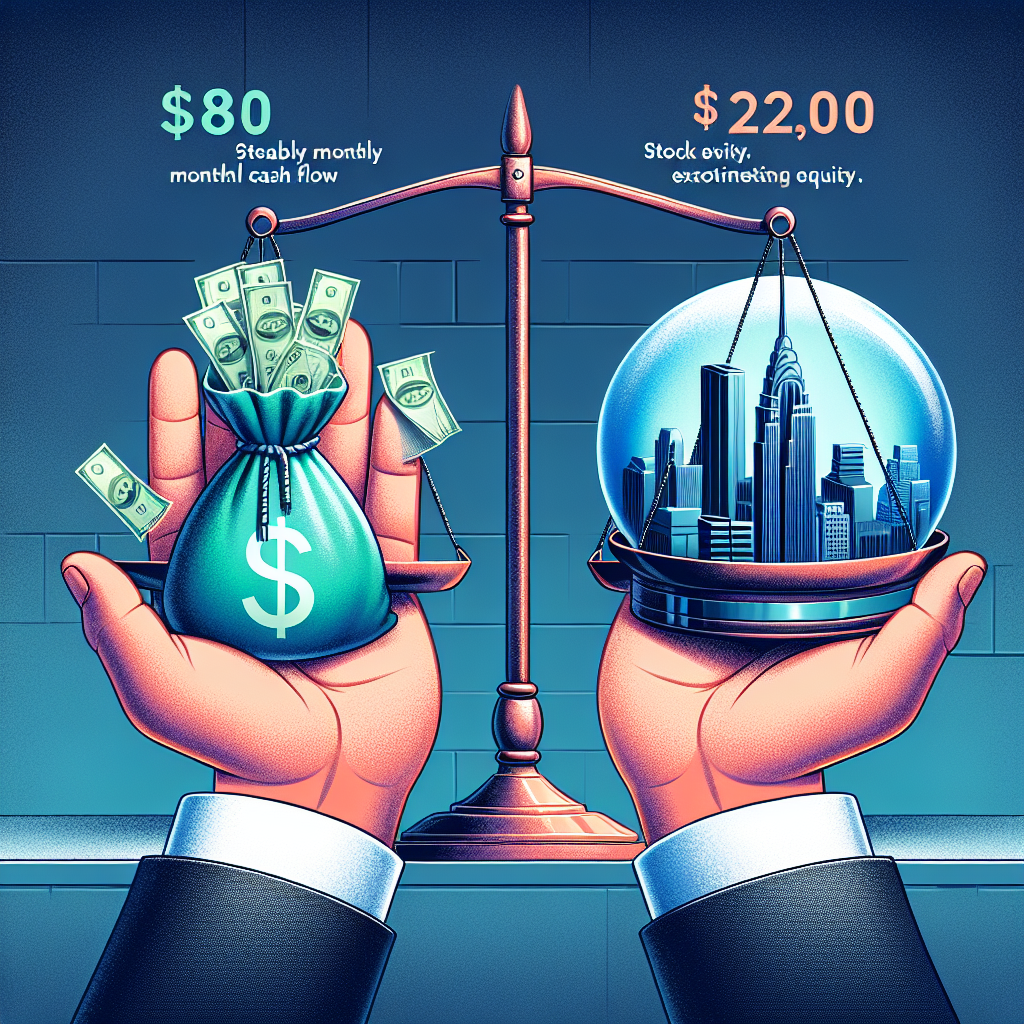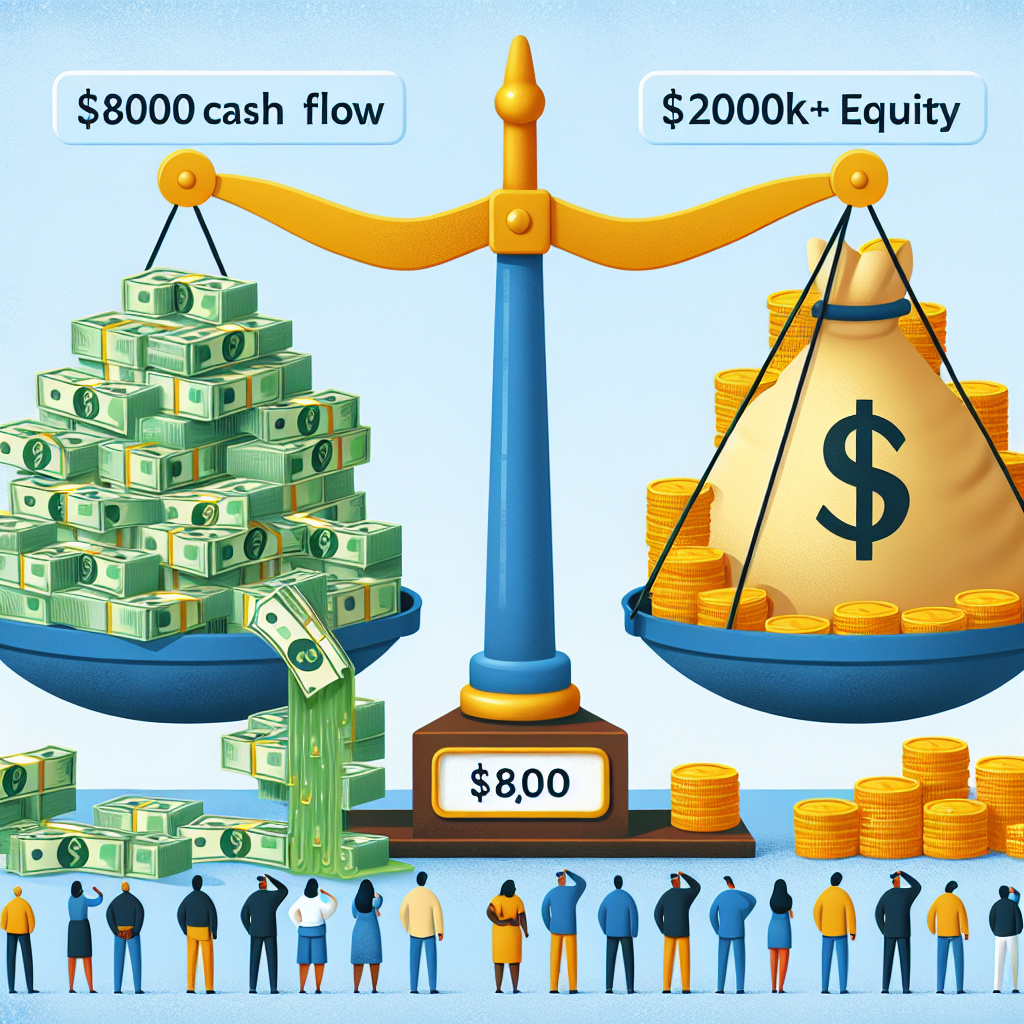-
Table of Contents
- Evaluating the Trade-Off: $800 Monthly Cash Flow vs. $200K+ Equity
- Understanding Cash Flow and Equity
- Cash Flow
- Equity
- The Appeal of $800 Monthly Cash Flow
- The Long-Term Benefits of $200K+ Equity
- Case Studies: Real-World Examples
- Case Study 1: The Cash Flow Investor
- Case Study 2: The Equity Investor
- Comparative Analysis
- Factors to Consider
- Investment Goals
- Market Conditions
- Risk Tolerance
- Time Horizon
- Strategies for Balancing Cash Flow and Equity
- Hybrid Approach
- Portfolio Diversification
- Value-Add Investments
- Conclusion
Evaluating the Trade-Off: $800 Monthly Cash Flow vs. $200K+ Equity

When it comes to real estate investment, one of the most critical decisions investors face is choosing between immediate cash flow and long-term equity. This article delves into the trade-off between an $800 monthly cash flow and over $200,000 in equity, providing a comprehensive analysis to help investors make informed decisions.
Understanding Cash Flow and Equity
Before diving into the trade-off, it’s essential to understand what cash flow and equity mean in the context of real estate investment.
Cash Flow
Cash flow refers to the net amount of money being transferred into and out of a property investment. Positive cash flow means that the property generates more income than expenses, providing the investor with a steady stream of income.
Equity
Equity, on the other hand, represents the difference between the market value of a property and the amount owed on the mortgage. It is the portion of the property that the investor truly owns and can be realized upon selling the property.
The Appeal of $800 Monthly Cash Flow
For many investors, the allure of a consistent $800 monthly cash flow is hard to resist. Here are some reasons why:
- Immediate Income: Provides a steady stream of income that can be used for various purposes, such as paying off debts, reinvesting, or covering living expenses.
- Financial Stability: Regular cash flow can offer financial stability, especially in uncertain economic times.
- Reinvestment Opportunities: The monthly income can be reinvested into other ventures, potentially compounding returns over time.
The Long-Term Benefits of $200K+ Equity
While immediate cash flow is attractive, building substantial equity offers significant long-term benefits:
- Wealth Accumulation: Equity growth contributes to overall wealth accumulation, providing a substantial financial cushion.
- Leverage for Future Investments: High equity can be leveraged to secure loans for future investments, expanding the investor’s portfolio.
- Appreciation Potential: Real estate properties often appreciate over time, increasing the value of the equity held.
Case Studies: Real-World Examples
To better understand the trade-off, let’s examine two real-world case studies.
Case Study 1: The Cash Flow Investor
John, a real estate investor, purchased a rental property for $150,000. After accounting for mortgage payments, property management fees, and maintenance costs, he nets $800 per month in cash flow.
- Initial Investment: $30,000 (20% down payment)
- Monthly Cash Flow: $800
- Annual Cash Flow: $9,600
Over five years, John accumulates $48,000 in cash flow. However, the property appreciates modestly, and his equity grows to $50,000.
Case Study 2: The Equity Investor
Sarah, another investor, buys a property for $300,000 in a rapidly appreciating neighborhood. She focuses on paying down the mortgage aggressively and improving the property to increase its value.
- Initial Investment: $60,000 (20% down payment)
- Monthly Cash Flow: $200 (after expenses)
- Annual Cash Flow: $2,400
After five years, the property appreciates significantly, and Sarah’s equity grows to $200,000. Her total cash flow over this period is $12,000.
Comparative Analysis
Comparing John and Sarah’s investments highlights the trade-off between cash flow and equity:
- John’s Total Cash Flow: $48,000
- John’s Equity: $50,000
- Sarah’s Total Cash Flow: $12,000
- Sarah’s Equity: $200,000
While John enjoys a higher immediate cash flow, Sarah’s focus on equity results in a significantly higher net worth over the same period.
Factors to Consider
When deciding between cash flow and equity, investors should consider several factors:
Investment Goals
Investors must align their strategy with their financial goals. Those seeking immediate income may prioritize cash flow, while those focused on long-term wealth accumulation may prioritize equity.
Market Conditions
Real estate market conditions play a crucial role. In appreciating markets, focusing on equity can yield substantial returns. In stable or declining markets, cash flow may be more reliable.
Risk Tolerance
Investors with a higher risk tolerance may opt for equity investments, which can offer higher returns but come with greater uncertainty. Risk-averse investors may prefer the stability of cash flow.
Time Horizon
The investment time horizon is critical. Short-term investors may prioritize cash flow, while long-term investors can benefit from the compounding effects of equity growth.
Strategies for Balancing Cash Flow and Equity
Investors don’t necessarily have to choose between cash flow and equity. Here are some strategies to balance both:
Hybrid Approach
A hybrid approach involves investing in properties that offer a balance of cash flow and equity growth. This strategy provides a steady income while building long-term wealth.
Portfolio Diversification
Diversifying the investment portfolio across different property types and locations can help balance cash flow and equity. For example, combining high-cash-flow rental properties with appreciating properties can achieve both goals.
Value-Add Investments
Investing in value-add properties—those that require improvements—can enhance both cash flow and equity. Renovations can increase rental income and property value simultaneously.
Conclusion
The trade-off between $800 monthly cash flow and $200K+ equity is a critical decision for real estate investors. While immediate cash flow offers financial stability and reinvestment opportunities, substantial equity provides long-term wealth accumulation and leverage for future investments.
Ultimately, the choice depends on individual investment goals, market conditions, risk tolerance, and time horizon. By understanding these factors and employing strategies to balance cash flow and equity, investors can make informed decisions that align with their financial objectives.
In the ever-evolving world of real estate investment, striking the right balance between cash flow and equity is key to achieving both short-term financial stability and long-term wealth growth.








